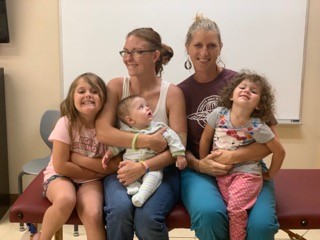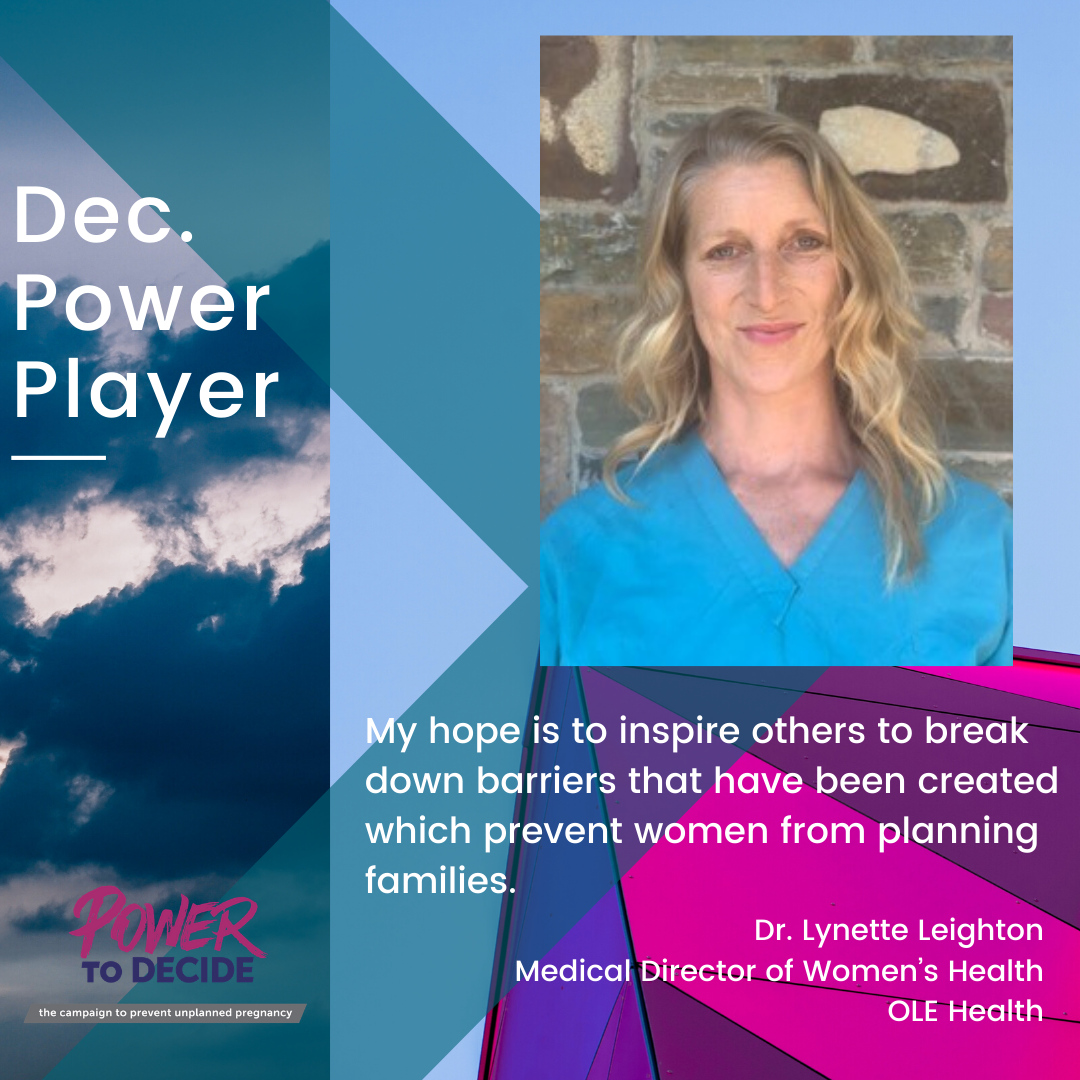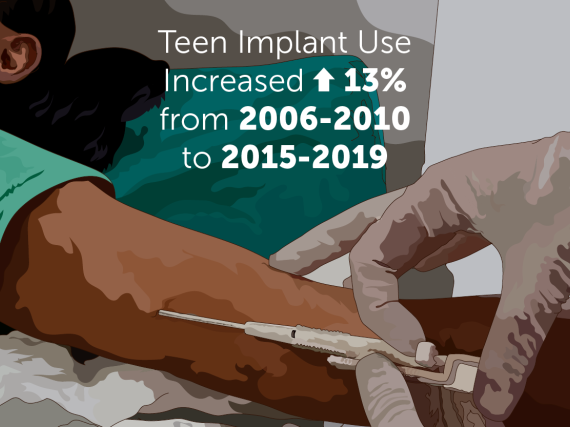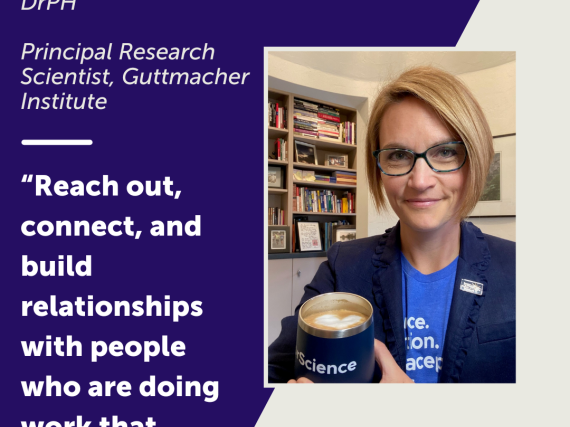DECEMBER 2019 POWER PLAYER
At Power to Decide, we’re committed to uplifting the many individuals on the ground doing the work that matters most. Each month we highlight an individual who is championing the effort to give young people the power to decide if, when, and under what circumstances to get pregnant and have a child. Check out this month's Power Player profile.
Lynette Leighton, MD
Medical Director of Women’s Health, OLE Health
What work have you done to ensure that young people have access to high-quality sexual health information or high-quality contraceptive services so that they can decide if, when, and under what circumstances to get pregnant and have a child?
Since 2012, I have worked as a Family Medicine physician at a Federally Qualified Health Center (FQHC), where we serve over 36,000 patients in Napa Valley. I later also became the Medical Director of Women’s Health. Most of our patients get obstetrical and gynecologic care through a local Catholic hospital or affiliated doctors. Unfortunately, the Catholic hospital places systemic restrictions on women’s health, including discussions about birth control and abortion, and refuses desired tubal ligations, even during C-sections. In some of the public high schools in Napa, sexual education is prohibited, and if it is offered, it’s through outside trainers or physical education instructors on an occasional basis. My mission from day one has been to educate our staff and community providers about the reproductive health needs of our community and develop systems that help increase access to these services. My hope is to inspire others to break down barriers that have been created which prevent women from planning families.
Specifically, my work has included improving access to tubal ligations at non-Catholic facilities; holding workshops for providers, staff, and community groups in Values Clarification and contraception; training providers how to insert IUDs and Nexplanons and on the importance of timely help with accessing contraception. We have also initiated One Key Question® at our clinic, so that every person of reproductive age gets the chance to discuss their family planning needs, starting at age 12, at any visit. In the community, I’ve initiated task forces to facilitate better collaboration better between clinics, foster care, and high schools. Also, I’ve been the on-site physician, providing the full range contraceptive services at a community center for at risk youth, which is my favorite day of work each month.
Outside of my community, I’ve also continued my advocacy work by speaking to California senate about funding for One Key Question or writing letters to the editor. Recently I’ve become a national trainer for One Key Question.
Such work is not always successful. Two years ago, after creating a workflow to offer medication abortions in our community clinic, I was told I had to stop this initiative. Many FQHC’s received letters threatening to defund them for offering abortions, so several clinics stopped offering them. There is a possible merger pending between our Catholic hospital and local non-affiliated hospitals, which could result in completely removing access to tubal ligations and decreasing access to contraception in our county. I’ve attended hearings and written letters to the Attorney General to resist this merger, but we fear it will go through.
How did you get started in your field? What is your driving force?
From an early age I was aware of the inequalities between genders, and I didn't agree with them. Boys’ athletic teams always got better equipment, uniforms, and playing times. In my own home, my mom made more money, but my dad still made all the decisions. Growing up, I had very few people to talk to about this and I was often told: “Don’t be so sensitive.” It dismayed me that other people did not have the same concern, that women were considered less important. I spoke up loudly and often. However, on the subject of abortion, I took it for granted. Abortion and contraception have been made legal federally, and I thought that was the end of the story. In medical school I learned differently, and through the group Medical Students for Choice, I learned a great deal more about abortion and contraception and that the future threats to our access to both, threaten woman’s autonomy. How is it that mostly male politicians determine what women can do with their bodies? After my family practice residency, I also completed a residency in family planning and learned to teach and advocate for both.

What advice would you give to someone looking to effect change in the field that you currently work in?
Dare to speak up in your health care center with a positive and consistent message. Honestly, evaluate the barriers you and your system create. Ask what could you do better to help patients get the care they need, including reproductive health care. Collaborate with likeminded folks in and out of your community. This will help you be more effective and will help you feel less lonely in this work.
Why should someone care about ensuring that all people—regardless of who they are or where they live—have access to the information and contraception they need to live their best life story?
It is a basic human right for any person to decide whether or not she wants to be pregnant, and to prevent or end a pregnancy if she doesn’t want to be pregnant. When women are not given the option of choosing to make a family on their terms, their life goals, physical health, and mental health often suffer. We have the ability in medical care to provide choice safely, and it is our obligation to do so.
Is there a highlight of your work in conjunction with our organization that you’d like to share?
Yes! In August of this year I joined Remote Access Medical (RAM) and Power to Decide to help provide contraception in rural Kentucky. RAM did not have the ability to pre-order Nexplanons as they had hoped, so I crowdsourced and raised the necessary funds from friends and family. None of those who contributed are particularly wealthy yet given the current climate regarding abortion in rural America everyone wanted to help, and they generously gave $4,000 in just one night! We provided long acting reversible contraception to several women. One young mom burst out crying when we told her we had a free Nexplanon for her. Two of her children were unplanned, the most recent is six months old. She said she was tired and broke and lived in fear of getting pregnant again. She had heard about the Nexplanon, found a local place that could place one, but they told her it would cost $500, which she couldn’t afford. We were able to provide a free Nexplanon, which provides her five years of less worry. She was blown away that folks from California and New York cared enough to make this happen and that I flew so far to help. It was an incredibly rewarding weekend.



